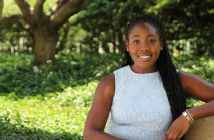After seeing that community service and civil rights organizations could not meet the legal needs of their South Asian clients, Shivani Parikh ’24 was inspired to start her community’s own legal defense fund.
“None of our nonprofits have legal capacity, and this is the heart of it all,” Parikh said of the South Asian Legal Defense Fund (SA LDF), which she founded in January 2024 alongside five attorneys serving on its Board of Directors. “The working-class families that we have here, though they’re provided direct social services, could greatly benefit from legal assistance that is culturally relevant and rooted in an understanding of racism, Islamophobia, and the ongoing War on Terror project.”
SA LDF provides vital community education and advocacy for myriad cultural, national, and religious identities and meets the needs of direct service nonprofits by providing access to attorneys and through litigation addressing injustice in all forms. The fund currently has five policy areas of focus: asylum seekers and refugees, law enforcement accountability, federal legislation, affirmative action, and voter support.
Upon arriving at Fordham Law School three years ago, Parikh brought her idea of starting a legal defense fund to Aisha Baruni, the former director of public interest scholars and counseling. During her 1L year, she feverishly went to the drawing board until she felt confident enough to present her idea to fellow lawyers and law students in late 2022. She also leaned on the information and advocacy tools that she learned from an access to justice seminar taught by Professor Bruce Green, Lauren Jones, legal & policy director at the National Center for Access to Justice, and David Udell, executive director at the National Center for Access to Justice, in the spring 2023 semester to better visualize what would ultimately become SA LDF.
“That class was basically like a training boot camp for a lot of the work that I envisioned myself doing throughout my career,” Parikh said. “My four classmates and I got a lot of personalized feedback and support from the three professors, which was also a real treat.”
 Parikh acknowledges that before SA LDF can begin to tackle crucial legal work, community relationships need to be made first, “A lot of base building has to happen [including]building relationships with the direct service organizations to understand what and where their legal needs are, participating in policy conversations that are happening at both the neighborhood and city levels, building relationships with our peer pan-Asian organizations at the local and national levels, and engaging with city youth.”
Parikh acknowledges that before SA LDF can begin to tackle crucial legal work, community relationships need to be made first, “A lot of base building has to happen [including]building relationships with the direct service organizations to understand what and where their legal needs are, participating in policy conversations that are happening at both the neighborhood and city levels, building relationships with our peer pan-Asian organizations at the local and national levels, and engaging with city youth.”
“I’ve seen the power of a philanthropic spirit when everybody buys into this core belief that community upliftment is a priority,” she added. “There’s the expression, ‘We are the ones that we’ve been waiting for,’ and I think that while my colleagues and I went to law school for different reasons and with different professional levels, our ethos is the same.”
After she graduates from Fordham Law in May, Parikh will work at Queens Legal Services as a housing defense attorney. She will also be building out SA LDF’s reach, scope, and capacity to defend and advance her community’s civil rights.




